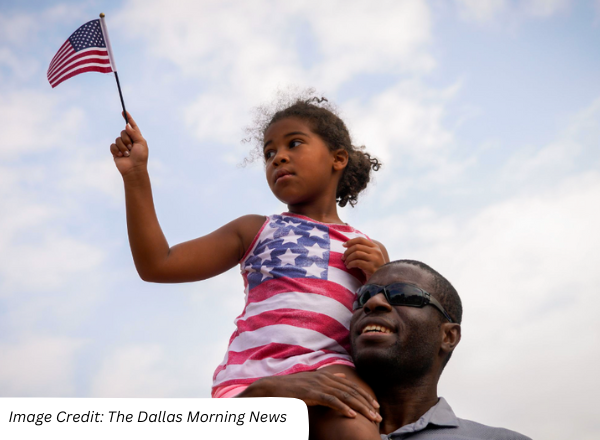July 4th, celebrated with countless parades, cookouts, and decorated red, white, and blue pageantry and patriotism still inspires hope in our hearts. The night sky, filled by the sounds and lights of fireworks; a tradition set during the first organized celebration in Philadelphia on July 4, 1977, represents our shared sacrifice and togetherness as a nation. However, it remains that Independence Day will have meant many different things to those who call our country home. As we observed many diverse races, ethnicities, and people of all backgrounds come together to commemorate our collective freedom, it remains clear that there still exists deep differences in the US of what July 4th will have meant to them.
Since I was a young child, my experiences have been shaped from the lens of a first-generation immigrant. I understood my patriotism as a commitment to service and betterment so I served as a police officer, educator, and an anti-hate advocate. This meant that I would have to appropriately balance gratitude with criticism my entire life and career. While my gratitude was typically welcomed; my criticism was not. It is as if people take personal offense if you show anything outside of gleeful pride, especially on patriotic holidays. In one parade that I attended in Oak Creek, WI, I offered to a white American born friend that I don’t see the same things that he sees when gazing upon the US flag. His reply was not to understand nor further ask what I meant, but rather he stated, “this is also your country,” as if this fact was lost upon me. I already know this is my country and I have served for the betterment of it for over 25 years so I didn’t need the reminder from him, what I needed was compassion and understanding.
The fact remains that our country was built upon dissent. However, some have come to the conclusion that dissent is anti-American and that some can dissent and others are unpatriotic if they do. Many January 6th insurrectionists were not deemed traitors and in fact many in our society attempted to understand their motives and provide leniency in criminal courts. Yet, many others who are dissenting do not receive this same consideration of patriotism, justice, and American betterment. Opinions contrary to the greatness of America are not welcomed, unless you are so-called “Making America Great Again.” Again, we were built upon dissent, so why do we not welcome it, especially by those who would not fit the American prototype of a patriot?
It is because we have long mistaken allegiance as a measure of American prosperity and progress, especially for those already in power. Many who have long been fighting for freedoms, voice and justice did so with the will of democratic dissent to further the intention of this great democracy. The pain of the oppressed in America has long offended those in power. Thus, July 4th has now become a weaponized reminder of compliance to a country that many call home; a country that you can serve and love but also a country that can never love you back. Thus, for nearly half of us who are citizens, July 4th is a bruising reminder of the need for compliance to a country that you can serve and love- but also a country that does not love you back.
Any mutual relationship of love is informed by continuous challenge, growth, and healing. It is not as if we can simply just fall in love and stay in that state of being forever. Love involves us to all participate in this relationship, not just simply romanticize the emotional hope and joy that the relationship first provided. On July 4th, we should indeed celebrate how far we have come but love should also call on us to recommit to a future that has learned from the past. In 1852, Fredrick Douglas, abolitionist, delivered a critique of the hypocrisy that Independence Day represents. He highlighted that July 4th “only reveals the immeasurable distance between us.” Douglas concluded his remarks by stating, “I leave off where I began, with hope.”
Thus, hope is also where I want to conclude because hope is a needed pillar of every loving relationship. Hope accompanied by commitment to work through the challenges. The greatness of the 4th is fulfilled when we love enough to challenge ourselves to be better and work towards universal dignity.
America, we love you and believe in you. Happy Independence Day!
 |